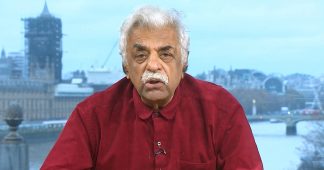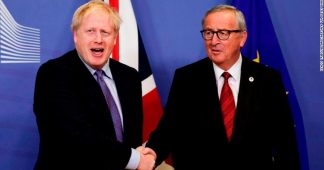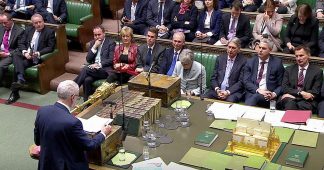By Dimitris Konstantakopoulos
In a previous article we discussed some of the most critical geopolitical consequences of the outcome of the 12 December British election. In this paper we will discuss the main factors which may impede the Labour Party from getting a majority and what historic experience indicates as the main keys for claiming hegemony. We will also examine the Brexit and EU question, under the light of the accumulated experience of a decade of unsuccessful efforts to oppose neoliberalism in Europe and the related strategies (or no strategies!) of the European Left. We are going also to discuss some very important aspects of the economic program of Labour, which represents the biggest hope of a break with catastrophic Neolibearlism in Europe, since 1981.
Two very conflicting visions of Britain and the world
On the one hand we have Boris Johnson, supported by a large part of the British, but also of the western establishment, in particular the neoconservatives, Israel and its lobbies, Trump and the Alt-Right movement. On the other hand, we have a very massive, for the standards of our times, social democratic reformist party, but which is led by a radical leadership and is presenting a very radical electoral platform.
Labour’s economic and social program is a clear break with the Neoliberal doctrine and the absolute, unhindered power of the Financial Capital which are dominating the West for some decades now, and which are directly responsible for the deep economic crisis begun in 2008, contributing also to the acceleration of the ecological crisis.
It represents the greatest hope for a reversal of the (proved) catastrophic neoliberal policies dominating for decades European and international economy, having emerged in a major European country, since the (finally non implemented) program of the French Union de la Gauche under Francois Mitterrand in 1981. And in some aspects is more radical than the 1981 program, trying to tackle in a different way the nationalisations question.
Johnson’s proposal is one of a renewed “ultra-neoliberalism”, “neo-Thatcherism” and a Brexit that may keep Britain under the yoke of important EU neoliberal institutions for years and will, most probably, transform it from a Brussels to a Washington satellite. Britain under Johnson will also contribute considerably to the continuation of the extremist, very dangerous imperialist policy already applied for almost two decades in the Middle East and internationally, with catastrophic consequences. It will also help the continuation of the attack of the large fossil fuel multinationals against the climate.
On the other hand, Labour’s economic, social and ecological program constitutes a blueprint for a radical paradigm change in the West. It is providing for more state regulation and a massive turn to a kind of “Green Keynsianism”, like the one professed by the left wing of the US Democratic Party. An open question remains of course how to apply Keynsianism without some form of protectionism, if you don’t want to see the demand leaving abroad and at what level you may apply such protectionism, national or regional, but we cannot discuss this question here. Another very serious question is the absence of international allies to help the Labour implement its ideas.
A very important aspect of Corbyn’s proposals is that it is taking into account the negative aspects of state economic management, proposing innovative forms of workers participation and social control, to address the long known problems of bureaucratization and of using the state enterprises on behalf of private interests.
With regard to Brexit, Labour remains rather unclear, or at least is perceived as such by a lot of people. It is proposing a second referendum between the agreement they will negotiate with the EU and the Remain option. Corbyn’s election also entails a radical shift in British international policy on issues such as the Middle East, nuclear weapons control and Western support for authoritarian regimes in Latin America. A Britain ruled by Labour will be most much more decisive in tackling climate change.
The Achilles’ heel of the Labour
If Corbyn’s Labour will eventually lose the elections, as the pollsters tell us, it won’t lose them because of its program, but because a part of the working class, for whom the Brexit and the respect of the verdict of the 2016 referendum is the symbol of their revolt and of the respect of popular sovereignty, feels “betrayed” by the position on Brexit. They are also probably suspecting that the “compromise” on Brexit may hide more general compromises to come.
Corbyn’s election as a leader of the Labour has been the result of a popular revolt. It is the same revolt which led to the victory of Brexit in the referendum, in alliance of course with a part of the British ruling class, dreaming of a Great Britain more strongly allied with the US and connected with the neocon faction of world establishment. Now, the social forces of revolt, which are the forces able to bring Corbyn to power if united, seem split. Only if Corbyn proves able to bridge at least partly this gap in the few remaining days, he can possibly win the elections. But the situation is objectively difficult, because this split is reflecting also deeper social divisions.
On the one hand we have working-class people, who have very pressing living problems and their accumulated in decades rage and despair and which are culturally more “traditional”. On the other hand we have the lower strata of the “petty bourgeoisie”, or aspiring to be such, which have more illusions about the possibility of reforming capitalism, but also the ability and disposition to think of more general problems such as climate change or cultural questions. Psychologically, in the first camp despair seems stronger than hope, in the second hope seems stronger than despair.
Some Labour cadres argue that Brexit is not the most important issue. They may have a point. There is no doubt that the EU is rapidly evolving into an unacceptable totalitarian structure. But the question is not there, it is what European order will replace it and how we get to that. To give an example, the USSR was also an unacceptable structure on many respects. But the way it was dismantled and the direction towards which the soviet nations have moved has been a huge historical setback leading to the biggest economic and social disaster (and the biggest looting of state property) in the history of the whole industrial civilization, with the exception of the two world wars. If, for example, the EU just breaks in a chaotic way, leading to the creation of a multitude of small states, competing with each other by methods of social and ecological dumping for a share of a shrinking demand, being at the mercy of the big banks and the Americans, that will not represent any big advance. It is a fact that a country that attempts to implement an anti-neoliberal program will clash with the EU very quickly and may be forced to leave. In such conditions leave would be an option. But even in such a case, leaving the EU does not automatically guarantee by itself a greater degree of national sovereignty in an environment of globalized capitalism.
It would make much more sense if Brexit, or any other “exit”, would come as a possible result of the effort to impose an anti-neoliberal order in Europe and in the name of such a vision, integrated into a strategy for a different European order, not as a nationalist backlash, a return to an impossible healthy “national capitalism”.
Of course, what makes sense is seldom happening in History by itself. The role of radical political forces is to translate into viable political strategy their general understanding of the situation.
Even if we admit Labour cadres who say the Brexit question is not the most important have probably a point, this way of putting things betrays a certain embarrassment, if not arrogance. For a radical leftist party how people are thinking and what they are thinking is a politically dominant question. Many accuse Lenin nowadays of all possible sins, still no one seriously denies his political and strategic genius. He described once the Bolsheviks as the only tendency inside the workers movement “which penetrates to all social strata, it is influencing them and is influenced by them”. It is not effective just telling people what is important, you need to engage in dialogue with them.











